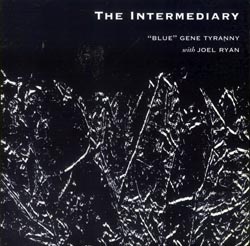
Recorded in 1982, "The Intermediary" was an early example of the use of emulative software designed to "listen" to an instrumentalist's output, process it and play it back into the room in more or less real time, allowing the original creator to converse with an altered version of him or herself. Ryan, along with Richard Teitelbaum, was one of the pioneers of this approach in the improvised music field, partnering here with Robert Ashley alum Tyranny for an engaging, quirky pair of pieces. At this stage, however, the "real time" aspect was still out of reach, so "The Intermediary" is a post-production artifact in that regard.
Tyranny's piano playing is nothing if not lush and here, computer issues aside, one often has the impression of listening to a prodigiously talented lounge pianist refracted through modernist prisms. Elsewhere, he resembles an unlikely amalgam of Abdullah Ibrahim and a refugee from Vince Guaraldi's "Peanuts" music. Indeed, once the image of an avant Schroeder enters one's head, it's difficult to shake. Much as Ashley, Tyranny constructs his pieces from bits of Americana, beautifully played and keeping overt irony to a minimum. In large part, the two tracks here are ruminations typical of Tyranny in his more expansive mode and can almost be listened to, and enjoyed, as such.
Except that there are these electronic disturbances that keep interfering...
As said above, it was early on in this particular game, the technology in a fairly primitive state (Ryan would go on to much more complex use of similar software with musicians like Evan Parker) so Tyranny recorded his improvisations in the wee hours of a morning, the results processed soon after and, via recording studio, mixed into the piano at a later date. So there's no secondary interaction on Tyranny's part to the interpretations made by the software, necessarily lending a somewhat disconnected air to the proceedings, his pastoral ambles "interrupted" here and there by alien electronica. This is interesting in and of itself, though listeners expecting a more organic series of interactions will have to readjust their ears.
Comments and Feedback:



More Recent Reviews, Articles, and Interviews @ The Squid's Ear...


|

